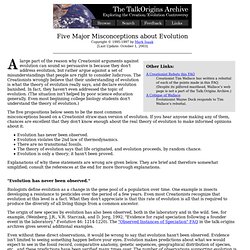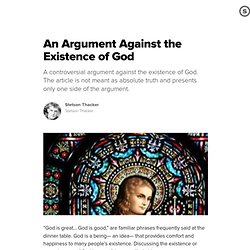

The Raving Theist. TalkOrigins Archive: Exploring the Creation/Evolution Controversy. Five Major Misconceptions about Evolution. Five Major Misconceptions about Evolution Copyright © 1995-1997 by Mark Isaak[Last Update: October 1, 2003] large part of the reason why Creationist arguments against evolution can sound so persuasive is because they don't address evolution, but rather argue against a set of misunderstandings that people are right to consider ludicrous.

The Creationists wrongly believe that their understanding of evolution is what the theory of evolution really says, and declare evolution banished. In fact, they haven't even addressed the topic of evolution. (The situation isn't helped by poor science education generally. Even most beginning college biology students don't understand the theory of evolution.) The five propositions below seem to be the most common misconceptions based on a Creationist straw-man version of evolution. Evolution has never been observed. "Evolution has never been observed. " Biologists define evolution as a change in the gene pool of a population over time. Conclusion. WMG/Mythology & Religion. The God Chemical: Brain Chemistry And Mysticism. Towards an anthropological definition of religion - Guido Verboom. By Guido Verboom Religion has been a topic of interest in the anthropological field since the early years.

It is sir Edward Burnett Tylor (1832 - 1917), who is considered as the founding father of the anthropological study of religion. He saw religion as a way to understand the unexplainable (Kottak 260). Nowadays the phenomena religion is seen as a cultural universal (van Beek 1982: 3)(Kottak: 260)(Morris: 1). But the concept of religion arguably not. In classical anthropology the definitions tend to focus on religion in `traditional´ societies. A unified set of beliefs and practices relative to sacred things, that is to say, things set apart and forbidden, - beliefs and practices which unite [into] one single moral community, all those who adhere to them (Durkheim [1915] 1964: 37 cited in Morris 1987). What also is worth noting is that he takes religion as being both believe and practice. Another definition is by Clifford Geertz. Guido Verboom Selected Bibliography Baal, J. v. and W.
An Argument Against the Existence of God. “God is great… God is good,” are familiar phrases frequently said at the dinner table.

God is a being— an idea— that provides comfort and happiness to many people’s existence. Discussing the existence or nonexistence of God is one of the most likely ideas to erupt an argument. It is my proposition that God defined from a Western perspective, (meaning that as a supreme being God possesses omnipotence, omniscience, and omnipresence), does not exist. This statement is carefully qualified because neither the idea of God from an Eastern perspective nor polytheistic beliefs are being considered in this argument. God’s existence cannot be proven with any empirical evidence nor can its function as a creator be rationalized; thus, its existence cannot be assumed except by a leap of faith. Those who believe in God have often argued that God exists because he must have created the universe.
Science explains and rationalizes the laws of our natural world. Aquinas, Thomas.